American Association of Physicists in Medicine
Chapter Awards
Jimmy Fenn Award
The purpose of the Award is to recognize SEAAPM members who have made significant contributions to the field of medical physics, the AAPM, and the SEAAPM during their career.
A maximum of two awards will be presented each year. SEAAPM members are invited to submit nominations to be considered for the Award. The nomination should provide information on the career contributions of the nominee to the medical physics profession, the AAPM, and the SEAAPM. A nomination must be endorsed by at least two SEAAPM members. All nominations should be sent to: past-president@seaapm.org The deadline for nominations will be stated in the Call for Nominations that will be sent to the SEAAPM membership each year.
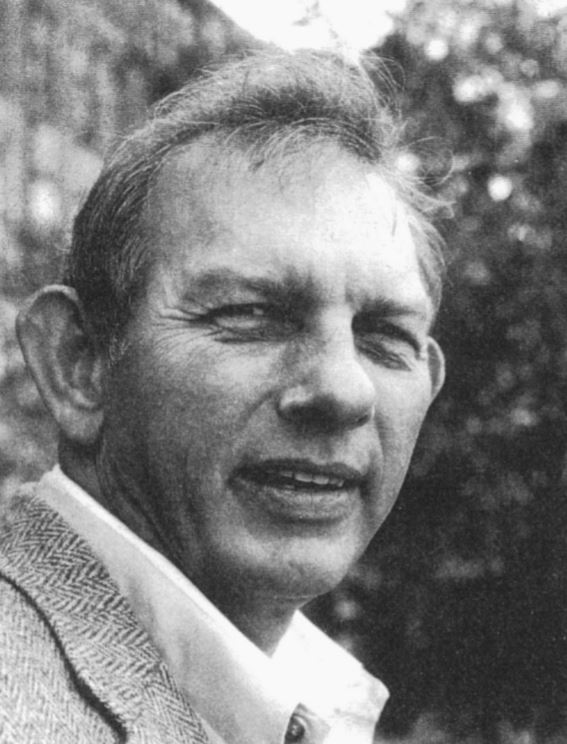 Dr. Jimmy Fenn, Professor Emeritus in Radiation Oncology, Medical University of South Carolina,
Charleston, South Carolina, was a Fellow of the American Association of
Physicists in Medicine (AAPM), the American College of Medical Physics (ACMP), and the
American College of Radiology (ACR). Jimmy's career in medical physics spanned nearly four
decades. Much of that time was spent at the Medical University of South Carolina where he served
as the head of radiation oncology physics from the early 1980's to his recent retirement in 1998.
Jimmy received his bachelor's degree in physics in 1965 from Lincoln Memorial University in
Tennessee and began his career in medical physics shortly thereafter as a radiation physicist in the
Department of Radiology at Emory University School of Medicine. During that time he also
continued his graduate studies at Emory University, receiving his master's degree in radiological
physics in 1967. He continued his graduate studies interspersed with his medical physics career
and in 1980 he received his doctoral degree in physics from the Georgia Institute of Technology.
In 1977, Jimmy was certified in Radiological Physics by the American Board of Radiology
(ABR), and in 1990 he was certified in Radiation Oncology Physics by the American Board of
Medical Physics (ABMP). Jimmy's efforts in supporting board certification for medical physicists
are well known. He never wavered in his belief of the importance of board certification and gave
unselfishly of his time serving both the ABR and the ABMP.
Dr. Jimmy Fenn, Professor Emeritus in Radiation Oncology, Medical University of South Carolina,
Charleston, South Carolina, was a Fellow of the American Association of
Physicists in Medicine (AAPM), the American College of Medical Physics (ACMP), and the
American College of Radiology (ACR). Jimmy's career in medical physics spanned nearly four
decades. Much of that time was spent at the Medical University of South Carolina where he served
as the head of radiation oncology physics from the early 1980's to his recent retirement in 1998.
Jimmy received his bachelor's degree in physics in 1965 from Lincoln Memorial University in
Tennessee and began his career in medical physics shortly thereafter as a radiation physicist in the
Department of Radiology at Emory University School of Medicine. During that time he also
continued his graduate studies at Emory University, receiving his master's degree in radiological
physics in 1967. He continued his graduate studies interspersed with his medical physics career
and in 1980 he received his doctoral degree in physics from the Georgia Institute of Technology.
In 1977, Jimmy was certified in Radiological Physics by the American Board of Radiology
(ABR), and in 1990 he was certified in Radiation Oncology Physics by the American Board of
Medical Physics (ABMP). Jimmy's efforts in supporting board certification for medical physicists
are well known. He never wavered in his belief of the importance of board certification and gave
unselfishly of his time serving both the ABR and the ABMP.
Jimmy was a highly respected clinical medical physicist. He held several leadership positions in medical physics serving as President of the Southeastern Chapter of the AAPM in 1972, and as an elected member of the AAPM Board of Directors from 1985 to 1988. He also gave unselfishly of his time serving on many AAPM committees and councils including the Professional Council and the Science Council. Jimmy was also very active in the ACMP, being elected to the Board of Chancellors in 1982–83. During that time, he was elected as Secretary for the ACMP. Over the next decade he continued his strong support in promoting ACMP's efforts regarding medical physics professional issues, and in 1991 was elected Chairman of the Board of Chancellors. In addition, he was also active in the ACR serving on the Radiation Physics Committee in the ACR Commission on Radiation Therapy during the years 1981 to 1988.
Throughout his career, Jimmy was strongly committed to the teaching of physician residents in radiology and radiation oncology, dosimetrists, and the mentoring of young physicists entering the field of medical physics. One of his greatest strengths was his ability to communicate effectively with trainees and shed light on even the most complicated subjects by using straightforward, clinically relevant examples.
Jimmy's untiring efforts and contributions to medical physics were recognized by his peers and radiation oncology colleagues as evidenced by his previously mentioned selection to Fellow status in all three organizations, AAPM, ACMP, and ACR. In 1999, Jimmy received the ACMP Marvin M.D. Williams Professional Achievement Award, its highest honor, recognizing his many contributions to the field.
Jimmy passed away on September 28, 2000 at the age of 62. He died of complications arising from pneumonia. For all of Jimmy Fenn's medical physics accomplishments, those of us who knew him well know that his real passion for living stemmed from his relationships with people and his love of the outdoors, particularly fishing. He left behind his beloved wife, Debbie, his two stepsons, Vincent and Cole, his son, Daniel and two daughters, Nancy Anne and Beth, his close friends in Charleston, and his many friends throughout the world. His efforts in promoting the profession of medical physics are well known, and will be long remembered. Equally well known is the way he conducted himself throughout his career, always being a man of high principle and always a true gentleman. He truly was a credit to our profession. He will be greatly missed.
Written by James A. Purdy, Ph.D.
George Sherouse Award for Trainee and Early Career Investigators
The purpose of this award is to provide recognition and a travel award for a Trainee or Early-Career Abstract Winner
Trainee Eligibility: A member-in-training/trainee must be a student currently enrolled in an accredited medical physics graduate program
Early-Career Eligibility: An early-career investigator is defiend as, at the time of abstract submission, being no more than two years post-graduate, or if post-graduate, must be in a medical physics residency program or a medical physics related postdoctoral fellowship. Only one first author submission from each early career investigator can be submitted for consideration for the early career investigator award.
Abstracts and support documents can be sent via email to past-president@seaapm.org
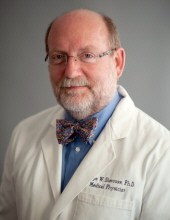
George W. Sherouse, PhD, FAAPM was a "force of nature" in the world of medical physics, to quote one AAPM President. Those who worked with him would likely readily agree that he also made an impact on many people in our field. Dr. Sherouse was an innovator in therapy physics, developing the first modern GUI-based 3D treatment planning system. He spent much of his career working in the states that comprise the SEAAPM and served our chapter through the presidential cycle from 1995-1998. One of his proudest professional accomplishments was the creation of a medical physics residency program at Vassar Brothers Medical Center in New York. This program was one of the first community practice-based residencies designed to provide formal clinical training of medical physicists. Dr. Sherouse was intensely focused on the quality of medical physics practice and how to pass on this knowledge to future generations of medical physicists. Through one-on-one mentorship, AAPM committee commitments, and involvement in residency programs, Dr. Sherouse helped shape safe practice in medical physics. George would say "It's our job to keep it on the rails."
The SEAAPM Executive Committee agreed, and wanted to see Dr. Sherouse's passion for medical physics education continue. Following his passing in January of 2022, SEAAPM leaders voted to establish the George Sherouse Investigator Award as a recognition and travel award to a recipient in honor of Dr. Sherouse's enthusiastic support for students and trainees. The award is for current trainees or early-career medical physicists who submit an abstract for an oral presentation to the SEAAPM Annual Scientific Meeting and are selected as the winner of a competition to recognize the best work in any field of medical physics.
Note: This award is for special recognition beyond that of submissions to the meeting's General Trainee session and has specific rules outlined below. Abstracts will be blinded to the panel of judges. Recognition will come in the form of an honorarium for travel, presentation in a special session of the SEAAPM Annual Scientific Meeting, promotion on the SEAAPM website and social media channels and a plaque to the winner!
A panel of judges will score the oral presentations according to criteria that includes scientific merit, originality, and organization/presentation of the material.
- A substantial part of the work reported in the abstract must have occurred within institutions or facilitates located in the SEAAPM geographic region.
- The Abstract is limited to 300 words and should be structured as Purpose, Methods, Results, and Conclusion.
- Supporting Document is REQUIRED and must not exceed 2 pages in length.
- No part of the Abstract or Supporting Document should contain identifying information such as title, author names, affiliations, institutions, etc. Submissions containing such information may be rejected without review.
- All abstracts submitted to the Early-Career Investigator Symposium Award that are NOT selected for as the winner, will be automatically considered for an oral presentation at the SEAAPM Annual Meeting in the General or General Trainee Session.
Award: A $1,000 honorarium to cover transportation to the meeting, presentation in a special session of the SEAAPM Annual Scientific Meeting, and a plaque to the winner.
Written by Carnell Hampton and David Piantino
Award History
| Jimmy O. Fenn Award | BJ Sintay, PhD, DABR for his outstanding career achievements, leadership in the medical physics profession, and his contributions to the SEAAPM Chapter. |
|---|---|
| Chapter Appreciation Award | David Piantino, MS, DABR for his dedication and service to the SEAAPM chapter as treasurer Michelle Rokni, MS, DABR for her dedication and service to the SEAAPM chapter as secretary |
| Best Paper Award | Moeen Meftahi, PhD et al. for their outstanding paper “A Novel Direction Modulated Brachytherapy Technique for Urethra Sparing in High-Dose-Rate Brachytherapy of Prostate Cancer". |
| George Sherouse Award | Madison E. McKinnon for “Development of a cost-effective quality assurance tool for the high-definition motion monitoring system in cobalt-based frameless stereotactic radiosurgery". |
| MedPhys Slam Winner | Jessica Dominici, MS for “Utilizing the IC Profiler with Optimized Gain Settings for Monthly QA: A Comparitive Study Across Varian Linac Models". |
| Jimmy O. Fenn Award | Michelle Wells,MS,DABR,FAAPM for her outstanding career achievements, leadership in the medical physics profession, and her contributions to the SEAAPM Chapter. |
|---|---|
| Chapter Appreciation Award | Megan Bright, MS, DABR for her dedication and service to the SEAAPM chapter as president Megan Russ, PhD, DABR for her dedication and service to the SEAAPM chapter as website coordinator |
| Best Paper Award | Chih-Wei Chang, PhD et al. for their outstanding paper “Early in vivo radiation damage quantification for pediatric craniospinal irradiation using longitudinal MRI for intensity modulated proton therapy". |
| Jimmy O. Fenn Award | Nicholas Koch, PhD and Sandra Burch McIntosh, PhD for their outstanding career achievements, leadership in the medical physics profession, and their contributions to the SEAAPM Chapter. |
|---|---|
| Chapter Appreciation Award | Carnell Hampton, PhD, for his dedication and service to the SEAAPM chapter as president Robert Rogers, MS, for his dedication and service to the SEAAPM chapter as AAPM board representative |
| Best Paper Award | 1. Dharmin D. Desai, PhD, Ivan L. Cordrey, PhD, and E.L. Johnson, PhD, for their outstanding paper “A measure of SRS/SRT plan quality: Quantitative limits for intermediate dose spill (R50%) in linac-based delivery” 2. Yang Lei, PhD, et al, for their outstanding paper “Automated lung tumor delineation on positron emission tomography/computed tomography via a hybrid regional network” |
| Jimmy O. Fenn Award | Michael T. Munley, PhD, DABR, FAAPM for his outstanding career achievements and leadership in the medical physics profession and his contributions to the SEAAPM chapter. |
|---|---|
| Chapter Appreciation Award | Stephanie Parker, MS, DABR, FAAPM, for her dedication and service to the SEAAPM chapter as president Josh Wilson, PhD, DABR, for his dedication and service to the SEAAPM chapter as secretary |
| Best Paper Award | Tong Ren for his outstanding research and publication: "Organic Field-Effect Transistors as Flexible, Tissue-Equivalent Radiation Dosimeters in Medical Applications" |
|---|---|
| Chapter Appreciation Award | Michelle Wells, for her dedication and service to the SEAAPM chapter as president Nicholas Koch, for his dedication and service to the SEAAPM chapter as board representative |
| Best Paper Award | Jesse Snyder for his outstanding research and publication: "Use of a plastic scintillator detector for patient-specific quality assurance of VMAT SRS" |
|---|---|
| Jimmy O. Fenn Award | Ehsan Samei, for his outstanding career achievements and leadership in the medical physics profession and his contributions to the SEAAPM chapter |
| Chapter Appreciation Award | BJ Sintay, for his dedication and service to the SEAAPM chapter as president Lane Hayes, for his dedication and service to the SEAAPM chapter as treasurer |
| Best Paper Award | Perry Sprawls for his outstanding research and publication: "DEVELOPING EFFECTIVE MENTAL KNOWLEDGE STRUCTURES FOR MEDICAL PHYSICS APPLICATIONS" |
|---|---|
| Chapter Appreciation Award | BJ Sintay, for his dedication and service to the SEAAPM chapter as president Chris Mart, for his dedication and service to the SEAAPM chapter as secretary |
| Best Diagnostic Paper Award | James Winslow and Ehsan Samei, for their outstanding research and publication: "A method for characterizing and matching CT image quality across CT scanners from different manufacturers" |
|---|---|
| Best Therapy Paper Award | Suk Yoon, Justus Adamson, and Mark Oldham, for their outstanding research and publication: "Enhancing radiation therapy through Cherenkov light-activated phototherapy" |
| Jimmy O. Fenn Award | George David, for his outstanding career achievements and leadership in the medical physics profession and his contributions to the SEAAPM chapter |
| Chapter Appreciation Award | Ben Robison, for his dedication and service to the SEAAPM chapter as president Thaddeus Wilson, for his dedication and service to the SEAAPM chapter as board representative |
| Best Paper Award | Mark Oldham, PhD, for his outstanding research and publication: "X-ray Psoralen Activated Cancer Therapy (X-PACT)" |
|---|---|
| Jimmy O. Fenn Award | Thaddeus Wilson, PhD, for his outstanding career achievements and leadership in the medical physics profession and his contributions to the SEAAPM chapter |
| Chapter Appreciation Award | David Wiant, PhD, for his dedication and service to the SEAAPM chapter as president Nick Koch, PhD, for his dedication and service to the SEAAPM chapter as treasurer |
| Best Paper Award | Jacob Gersh, PhD, for his outstanding research and publication: "Determination of kQ using MLC-collimated rectangular fields for absolute dosimetry of the Cyberknife" |
|---|---|
| Jimmy O. Fenn Award | Robert L. Dixon, PhD, for his outstanding career achievements and leadership in the medical physics profession and his contributions to the SEAAPM chapter |
| Chapter Appreciation Award | George S. David, MS, for his dedication and service to the SEAAPM chapter as president |
| Best Paper Award | Robert L. Dixon, PhD, John M. Boone, PhD, & Robert A. Kraft, PhD for their outstanding research and publication: "Dose equations for shift-variant CT acquisition modes using variable pitch, tube current, and aperture, and the meaning of their associated CTDI(vol)" |
|---|---|
| Jimmy O. Fenn Award | David L. Vassy, Jr., MS, for his outstanding career achievements and leadership in the medical physics profession and his contributions to the SEAAPM chapter |
| Chapter Appreciation Award | Allan F. DeGuzman, PhD, for his dedication and service to the SEAAPM chapter as president |
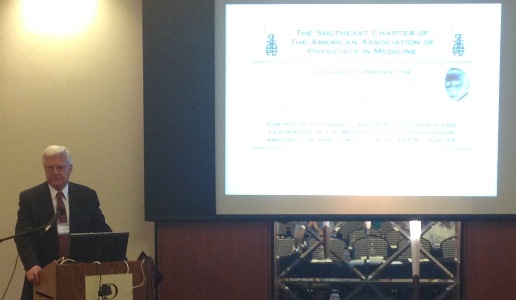
Dr. Kenneth Vanek was the recipient of the 2014 Jimmy Fenn Lifetime Achievement Award.
Dr. Michael T. Munley, winner of the Best Paper Award, for An Introduction to Molectular Imaging in Radiation Oncology: A Report by the AAPM Working Group on Molectular Imaging in Radiation Oncology (WGMIR)
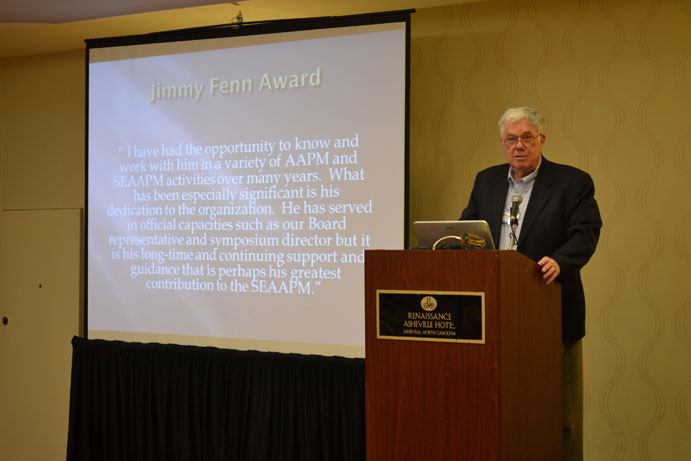
Dr. Robert Wilson was the recipient of the 2013 Jimmy Fenn Lifetime Achievement Award.
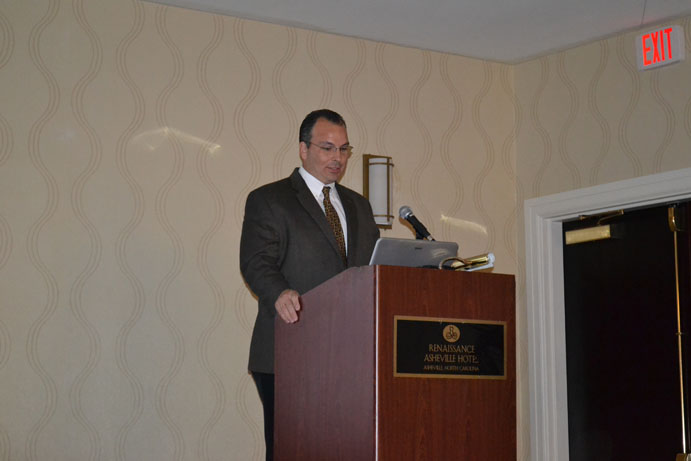
Dr. Ioannis Sechopoulos, winner of the Best Paper Award, for Characterization of the Homogeneous Tissue Mixture Approximation in Breast Imaging Dosimetry (Med. Phys. 39(8), 2012)
Dr. J. Daniel Bourland was the recipient of the 2012 Jimmy Fenn Lifetime Achievement Award.
Mr. Steve S. Feng and Dr. Ioannis Sechopoulos, winner of the Best Paper Award, for A Software-Based X-Ray Scatter Correction Method for Breast Tomosynthesis (Med. Phys. 38, 2011)


Dr. Ivan Brezovich, winner of the 2011 Jimmy Fenn Award.
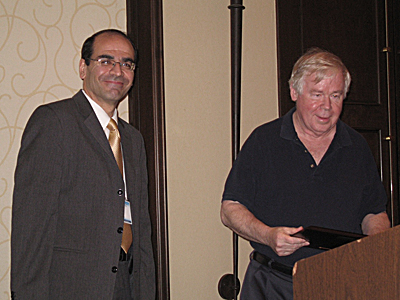
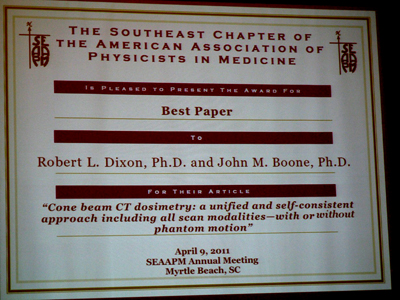
Dr. Robert Dixon, winner of the Best Paper Award, for Cone beam CT dosimetry: A unified and self-consistent approach including all scan modalities---With or without phantom motion (Med. Phys. 37, 2010)
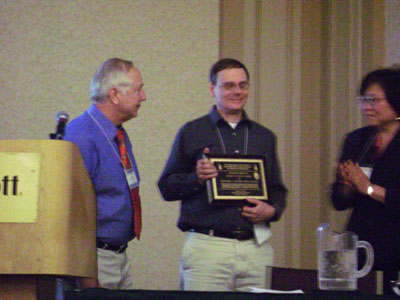
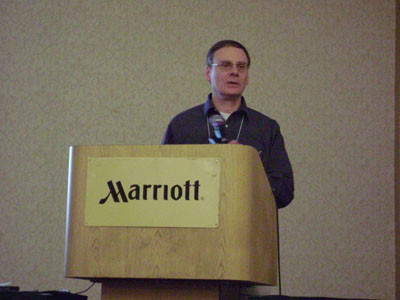
Dr. Mike Yester, winner of the 2010 Jimmy Fenn Award.
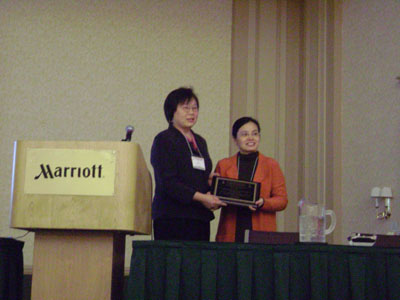
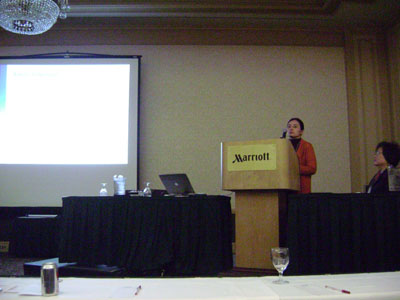
Dr. Jackie Wu, winner of the Best Paper Award, for Volumetric Arc Intensity-Modulated Therapy for Spine Body Radiotherapy: Comparison with Static Intensity-Modulated Treatment.
Dr. Perry Sprawls was the recipient of the 2008 Jimmy Fenn Lifetime Achievement Award.
Dr. Sprawls also received the 2008 Best Paper award, for Evolving Models for Medical Physics Education and Training: A Global Perspective.
Gary Barnes was the recipient of the 2007 Jimmy Fenn Lifetime Achievement Award.
The 2007 Best Paper in Radiation Therapy was awarded to Rebecca Seibert, Chester Ramsey, Dustin Garvey, J. Wesley Hines, Benjamin Robison and Samuel Outten, for Verfication of Helical Tomogherapy Delivery using Autoassociative Kernal Regression.
The 2007 Best Paper in Imaging was awarded to Sankar Suryanarayanan, Andrew Karellas, Srinivasan Vedantham, Ioannis Sechopoulos and Carl D'Orsi for Detection of Simulated Microcalcifications in a Phantom with Digital Mammography.
Don Frey was the recipient of the 2006 Jimmy Fenn Lifetime Achievement Award.
The 2006 Best Paper in Radiation Therapy was awarded to Ivan A. Brzovich, Richard A. Popple and Jun Duan for Use of a Multileaf Collimator to Increase the Field Width Achievable with a Dynamic Wedge.
The 2006 Best Paper in Imaging was awarded to Christian T. Badea, Laurence W. Hedlund, Ming De Lin, Julie F. Boslego Mackel and G. Allan Johnson for Tumor Imaging in Small Animals with a Combined Micro-CT / Micro-DSA System using Iodinated Conventional and Blood Pool Contrast Agents.
The 2006 Best Overall Paper was awarded to Sung-Joon Ye, Prem N. Pareek, Sharon Spencer, Jun Duan and Ivan A. Brezovich for Monte Carlo Techniques for Scattering Foil Design and Dosimetry in Total Skin Electron Irradiations.
Xizeng Wu and Hong Liu were awarded the 2005 Best Paper Award for A New Theory of Phase-Contrast X-Ray Imaging Based on Wigner Distributions.
The 2004 Best Papers were awarded to Robert L. Dixon for A New Look at CT Dose Measurement: Beyond CTDI; and to Jun Duan, Sui Shen, John B. Fiveash, Ivan A. Brezovich, Richard Popple and Prem N. Pareek for Dosimetric Effect of Respiration-gated Beam on IMRT Delivery.
The 2003 Best Paper was awarded to Sanjiv S. Samant for Verification of Multileaf Collimator Leaf Positions Using an Electronic Portal Imaging Device.
The 2002 Best Paper was awarded to Wlad T. Sobol for A Model for Tracking Concentration of Chemical Compounds within a Tank of an Automatic Film Processor.
The 2001 Best Paper was award to John P. Gibbons for Monitor Unit Calculations for External Phton and Electron Beams.
John Trueblood was the recipient of the 2001 Jimmy Fenn Lifetime Achievement Award.
The 2000 Best Paper was award to Chester R. Ramsy, Ivan L. Cordrey, and Adrian Oliver for A Comparison of Beam Characteristics for Gated and Nongated Clinical X-ray Beams.
The 1995 Best Paper was award to John P. Gibbons and Faiz M. Khan for Calculation of Dose in Asymmetric Photon Fields.
The 1982 Best Paper was awarded to Gary Barnes for Radiographic Mottle: A Comprehensive Theory
The 1981 Best Paper was awarded to Donald Herbert for Battered Data - Some Clinical Effects of the Abuse of Multiple Regression Methods: The NSD
The 1980 Best Paper was awarded to Jerry Allison for Cadmium Telluride Matrix Gamma Camera
The 1979 Best Paper was awarded to Robert Dixon and Kenneth Ekstrand for Linear Accelerator Calibration Monitor with a Memory
The 1977 Best Paper was awarded to Perry Sprawls for The Physical Principles of Diagnostic Radiology